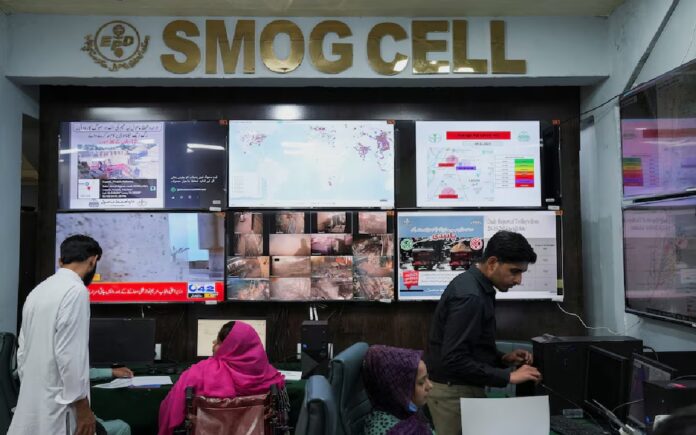Lahore: Pakistan’s Punjab province has established a “smog war room” to combat hazardous air quality, officials announced, as pollution levels in Lahore have escalated, positioning the city as the world’s most polluted. According to live data from Swiss monitoring group IQAir, Lahore registered a staggering air quality index (AQI) score of 1165, surpassing New Delhi, which trailed with a score of 299.
“The war room committee will review weather and air quality forecasts daily, and monitor the performance and actions of field officers,” explained Sajid Bashir, a spokesperson for Punjab’s environment department. The newly formed war room integrates representatives from eight departments, consolidating efforts under a single coordinator to manage initiatives ranging from controlling agricultural waste burning to regulating vehicular emissions.
Punjab’s war room will conduct two daily sessions to analyze data, provide forecasts, and brief stakeholders on current anti-pollution efforts. In addition, it will issue public advisories each day to keep residents informed of health precautions.

The recent AQI reading, while alarming, was still lower than last week’s unprecedented high of 1900, which exceeded safe levels by over 120 times and prompted emergency responses, including the closure of primary schools and a temporary shift to remote work.
Also Read | Netanyahu Dismisses Defense Minister Gallant, Reshaping Israeli Leadership Amid Intensifying Conflict
Punjab’s senior minister, Marriyum Aurangzeb, attributed part of the pollution to cross-border effects, noting that pollutants drifting from India, which lies just 25 km (16 miles) away, exacerbated the crisis. Northern regions of India, facing similar air quality issues, also experience hazardous pollution levels, particularly as emissions, dust, and smoke are trapped by winter’s cold air, a phenomenon that shrouds much of South Asia every year.
Aurangzeb further announced that Punjab plans to request Pakistan’s foreign office to formally address the pollution impact with India’s foreign ministry, underscoring the regional nature of the crisis.
Also Read | Mount Lewotobi’s Eruptions Trigger Long-Term Relocation for Thousands in Indonesia
The severity of winter pollution across South Asia has been shown to reduce average life expectancy by more than five years, according to recent studies. Meanwhile, New Delhi, rated the world’s most polluted capital for four consecutive years by IQAir, is also exploring innovative solutions. On Tuesday, Delhi’s environment minister announced that officials are considering artificial rain to help alleviate the city’s seasonal pollution problem.



